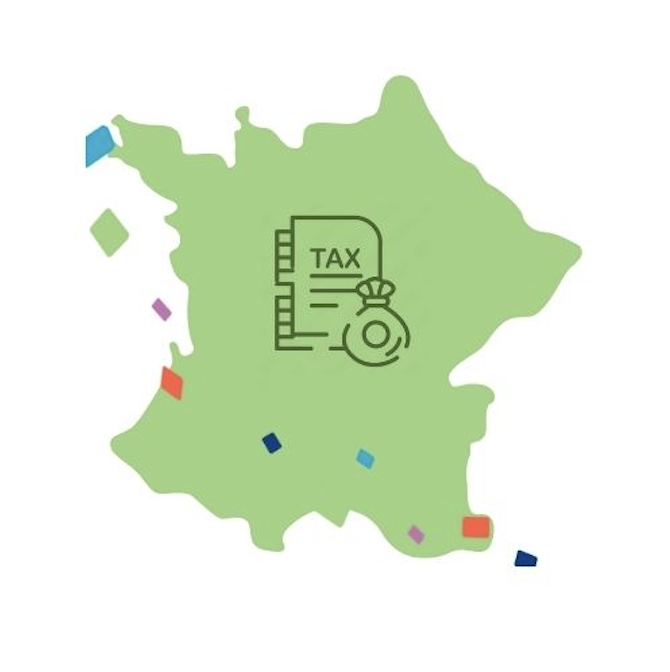Understanding Gift and Gift Card Taxation In France: A Quick Overview


by Signe Hegart
October 25, 2023
One of the most important aspects to consider when using gift cards as rewards or incentives in France is the taxation rules. Understanding the tax implications is crucial for companies that operate across departments and use gift cards as a means of rewarding employees or clients. In this blog post, we will provide a quick overview of gift card taxation in France.
Jump to section
Gift Card Taxation in France
Gift cards offered to employees in France are subject to specific taxation rules. They are generally not taxed if they do not exceed the threshold of €171 per employee per year. This threshold is equivalent to 5% of the monthly social security ceiling. In other words, employers can provide gift cards to their employees as rewards or incentives without incurring additional tax liabilities, as long as the total value of the gift cards per employee remains below this €171 limit.
However, to ensure that these rewards are exempt from social security contributions, there are specific conditions that employers must meet. One of the key conditions is that the rewards should be distributed in the context of specific events or occasions. The URSSAFF, which is the social security agency responsible for such matters, provides a list of recognized events for this purpose. These recognized events include:
Birth or adoption
Employers can provide gift cards to celebrate the birth of an employee’s child or adoption.
Marriage or civil partnership
Gift cards can be given to employees to mark their weddings or civil partnerships.
Retirement
Employees who are retiring can also receive gift cards as a parting gesture.
Mother’s Day and Father’s Day
Recognized as occasions for giving gift cards to employees.
St. Catherine’s Day and St. Nicholas’ Day
These are traditional celebrations in certain regions of France, and gift cards can be distributed on these occasions.
Christmas
Employers can provide gift cards to employees and their children up to the age of 16 in the calendar year.
Start of the school year
For employees with children under 26 years old, gift cards can be awarded at the start of the school year. However, this is subject to proof of school attendance.
By adhering to these guidelines and recognizing the specified events, employers can provide gift cards as non-taxable rewards and maintain compliance with French taxation and social security regulations. This approach can be beneficial for both employers and employees, as it allows for meaningful and tax-advantageous recognition of various life events
Source: PWC
What are Gift Card Taxation laws? ⚖️
Gift card taxation laws refer to the regulations and guidelines set by the government regarding the tax treatment of gift cards. These laws determine how gift cards are taxed and what obligations both the issuing company and the recipient have.
In France, gift card taxation is subject to specific rules. The French tax system treats gift cards as a form of income, and therefore they are subject to taxation. The tax treatment depends on various factors, including the type of gift card, the value, and the purpose of its use.
Gift cards provided by employers as a form of employee incentive or benefit are considered as part of the employee’s remuneration and are subject to income tax and social security contributions. The employer is responsible for withholding and paying these taxes on behalf of the employee.
For gift cards that are given to employees on special occasions such as birthdays or holidays, they are considered as non-cash benefits. The value of the gift card should be included in the employee’s taxable income, and the employer should report it accordingly.
When it comes to gift cards given by businesses to their customers as promotional tools or rewards, the tax treatment differs. If the value of the gift card is less than €69, it is generally exempt from income tax and social security contributions. However, if the value exceeds €69, the entire amount is subject to taxation.
As for individuals who receive gift cards from friends or family members, they are generally not subject to income tax. However, if the gift card is given as part of a business transaction or as compensation for services rendered, it may be subject to taxation.
Gift Card Taxation Rules for Companies in France with International Employees
Gift card taxation in France but with employees in other countries can be complex and may vary depending on the specific tax regulations of both France and the employees’ respective countries. Here are some general considerations:
Taxation in France
In France, if a company provides gift cards to its employees, these are typically considered a form of non-cash benefits and are subject to social charges (cotisations sociales) and income tax. The value of the gift cards is added to the employee’s taxable income.
Taxation in the Employee’s Country
The tax treatment of gift cards in the employee’s country may differ. Some countries may have specific rules regarding non-cash benefits and their taxation. It’s essential to consult the tax authorities or a tax professional in the employee’s country to understand the local tax implications.
Double Taxation
The possibility of double taxation, where the same income is taxed in both France and the employee’s country, is a concern. To mitigate double taxation, France has tax treaties with many countries that provide rules for determining which country has the primary taxing rights and mechanisms for providing relief, such as tax credits or exemptions.
Withholding and Reporting
Companies need to be aware of their withholding and reporting obligations both in France and the employee’s country. Compliance with tax authorities in both jurisdictions is crucial.
Gift Card Characteristics
The specific characteristics of the gift card can also impact taxation. For example, if the gift card can only be used for specific goods or services, it might be treated differently for tax purposes.
Local Regulations
Regulations can change over time and vary by country. It’s crucial to stay informed about the tax laws and regulations in each country where employees are located.
Tax Advisors
Given the complexity of international tax matters, it’s highly recommended to consult with tax advisors or professionals who specialize in cross-border taxation to ensure compliance and minimize tax liabilities.
To navigate Gift Card Taxation In France for employees in multiple countries, it’s crucial to work closely with tax experts who have expertise in both French tax law and the tax regulations of the employees’ respective countries. They can provide guidance on compliance, tax planning, and avoiding double taxation.
Read also: How big is the gift card market in Europe? Statistics + Trends
Why are Gift Card Taxation laws important?
Understanding gift card taxation laws is important for companies using rewards and incentives across departments in France for several reasons:
- Compliance: By understanding and following the gift card taxation laws, companies can ensure they are compliant with the regulations set by the government. This helps them avoid any legal issues or penalties that may arise from non-compliance.
- Cost management: Gift card taxation laws determine the tax obligations for both the issuing company and the recipient. By understanding these laws, companies can accurately calculate the tax liabilities associated with providing gift cards as rewards or incentives. This helps in effective cost management and budgeting.
- Employee satisfaction: For companies that use gift cards as employee benefits or incentives, understanding the tax implications can help them communicate the complete value of the reward to their employees. By transparently explaining the tax treatment, companies can ensure that employees are aware of any tax implications and can make informed decisions about the use of their rewards.
- Record-keeping: Gift card taxation laws require employers to report the value of gift cards provided to employees as part of their taxable income. By understanding these laws, companies can maintain accurate records and fulfill their reporting obligations to the tax authorities.
- Customer relations: For businesses that use gift cards as promotional tools or rewards for customers, understanding the tax treatment ensures they are aware of any tax liabilities associated with providing these gifts. This helps businesses manage customer expectations and maintain positive relationships.
Related: Are Gift Cards for Employees Taxable? US Expert Insights
Reporting obligations for Gift Cards
Both employers and businesses have reporting obligations when it comes to gift cards. Employers should include the value of gift cards provided to employees as part of their annual reporting of employee remuneration. This information is necessary for calculating income tax and social security contributions.
Businesses that give gift cards to customers as promotional tools or rewards also have reporting obligations. They are required to keep a record of the gift cards issued and report the value of those exceeding €69 to tax authorities.

Send yourself a gift card
Types of Gift Cards ????
There are various types of gift cards that are subject to different tax treatments in France. Some common types include:

Employee Benefits
Gift cards provided by employers as a form of employee benefit or incentive are considered part of the employee’s remuneration and are subject to income tax and social security contributions.

Special Occasions
Gift cards given to employees on special occasions such as birthdays or holidays are considered non-cash benefits. The value of the gift card should be included in the employee’s taxable income, and the employer should report it accordingly.

Promotional Tools or Rewards
Gift cards given by businesses to their customers as promotional tools or rewards have a different tax treatment. If the value of the gift card is less than €69, it is generally exempt from income tax and social security contributions. However, if the value exceeds €69, the entire amount is subject to taxation.

Personal Gifts
Individuals who receive gift cards from friends or family members are generally not subject to income tax. However, if the gift card is given as part of a business transaction or as compensation for services rendered, it may be subject to taxation.
Read also: 21 Gift Cards for Employees Loved by Customers
Companies complying with Gift Card Taxation in France
To ensure compliance with gift card taxation in France, companies should keep in mind the following:
1. Understand the tax treatment: Familiarize yourself with the specific rules and regulations regarding gift card taxation in France. This will help ensure that you are aware of your obligations and can accurately report and pay the necessary taxes.
2. Keep accurate records: Maintain detailed records of gift cards issued, including the value and purpose of their use. This information will be crucial for reporting purposes and will help you demonstrate compliance if audited.
3. Consult with tax professionals: If you are unsure about any aspect of Gift Card Taxation In France, it is advisable to consult with tax professionals who specialize in French tax laws. They can provide guidance and ensure that you are following the correct procedures.
4. Communicate with employees and customers: Keep your employees and customers informed about the tax implications of gift cards. Ensure that they understand the potential tax consequences and any reporting obligations that may apply.
5. Review your company policies: Review your company policies regarding gift card issuance and use. Make any necessary updates to ensure that they align with the current tax regulations and reporting requirements.
6. Regularly monitor and review regulations: Stay up to date with any changes or updates to gift card taxation laws in France. Regularly review your practices and procedures to ensure ongoing compliance with the most current regulations.
7. Implement proper accounting procedures: Establish proper accounting procedures to accurately track and record gift card transactions. This will help streamline the reporting process and ensure that all necessary information is readily available.
8. Seek professional advice for cross-border transactions: If your company operates internationally and issues gift cards across borders, it is important to seek professional advice on the tax implications of these transactions. Different countries may have different regulations, and it is crucial to comply with the tax laws of each jurisdiction.
By following these guidelines, companies can ensure compliance with Gift Card Taxation In France and avoid any potential penalties or legal issues. It is important to stay informed and proactive in managing gift card taxation to maintain financial and legal integrity within your organization.
Let’s have a chat
Case studies to illustrate how Gift Card Taxation In France works in different scenarios
Case Study 1: Employee Appreciation Gift Cards
Scenario: A medium-sized French company, XYZ Corporation, decides to reward its employees for their hard work and dedication throughout the year by giving each of them a gift card valued at €150. The company plans to distribute these gift cards to all employees during a year-end celebration.
Taxation: In this scenario, the gift cards fall below the €171 per employee per year threshold. As a result, these gift cards are not subject to taxation, and the company doesn’t need to pay additional social security contributions.
Case Study 2: Birth of an Employee’s Child
Scenario: One of the employees at ABC Corporation, a large French firm, becomes a new parent due to the birth of their child. In celebration, the company provides the employee with a €200 gift card.
Taxation: The gift card in this case is tied to a recognized event, which is the birth of the employee’s child. Even though the gift card value exceeds the €171 threshold, it is exempt from taxation and social security contributions because it is linked to the birth event.
Case Study 3: Christmas Gift Cards for Employees and Children
Scenario: A small French business, SmallCo, decides to spread holiday cheer by giving each of its employees a €100 gift card for Christmas. SmallCo also provides €50 gift cards to each employee’s child under the age of 16.
Taxation: The Christmas gift cards for employees are not taxed, as they are below the €171 limit. Additionally, the gift cards for the children are also exempt from taxation, as long as the children are under the age of 16 in the calendar year.
Case Study 4: Retirement Celebration
Scenario: An employee at French firm PQR Ltd. is retiring after decades of service. The company presents the retiring employee with a €300 gift card at a retirement party.
Taxation: The retirement gift card is tied to a recognized event (retirement), so it is not subject to taxation or social security contributions. The value of the gift card does not impact its tax-exempt status.
Case Study 5: Employee’s Child Starting School
Scenario: A French tech company, TechSolutions, gives a €200 gift card to an employee whose child is starting school. The employee provides documentation of the child’s enrollment.
Taxation: The gift card, given in recognition of the employee’s child starting school, is also exempt from taxation and social security contributions since it is linked to a recognized event and supported by proof of school enrollment.
These case studies demonstrate how the gift cards taxation in France is influenced by the nature of the event, the value of the gift card, and whether the specific conditions set by URSSAFF are met. Employers must be aware of these factors to ensure compliance with the tax regulations while rewarding and appreciating their employees.
Read also: Gift And Gift Card Taxation in Germany Simplified
Key points about Gift taxation in France
In France, gifts and inheritances are subject to a taxation system known as “droits de mutation” or “gift and inheritance tax.” This tax is governed by the French Tax Code (Code général des impôts) and can vary depending on the relationship between the donor (the person giving the gift) and the recipient (the person receiving the gift). Here are some key points about gift and gift card taxation in France:
Tax Rates: The tax rates for gift taxation in France are progressive, meaning they increase as the value of the gift and the relationship between the donor and the recipient change. The rates are typically higher for gifts to non-relatives.
Exemptions: There are exemptions and allowances that can reduce or eliminate gift tax liability. These exemptions are based on the relationship between the donor and the recipient and the value of the gift. For example, gifts between spouses or PACS partners are often exempt from gift tax. There are also exemptions for gifts to children, grandchildren, and other close relatives, subject to certain limits.
Lifetime Allowances: In addition to the exemptions, there are lifetime allowances for gifts to certain family members. These allowances are updated periodically and allow for tax-free gifts up to a certain amount.
Reporting and Filing: In France, gifts must be declared to the tax authorities. The donor is typically responsible for reporting the gift, and both the donor and the recipient may be required to file a gift tax return. The tax return should provide details about the gift’s value, the relationship between the parties, and any applicable exemptions.
Gifts of Real Estate: Gifts of real estate are subject to specific regulations. These gifts may trigger additional costs and tax obligations, such as property transfer taxes.
Penalties for Non-Compliance: Failure to declare a gift or comply with gift taxation laws in France can result in penalties and interest charges. It’s important to ensure that gifts are properly reported and taxes are paid in accordance with the law.
Legal Advice: Given the complexity of gift taxation in France and the potential implications for both the donor and the recipient, individuals often seek legal advice when planning significant gifts or inheritances. This can help them understand the tax implications and optimize their financial planning.
Succession Planning: Gift taxation is closely linked to inheritance tax, and individuals often consider both when engaging in succession planning. Careful planning can help reduce the overall tax burden on gifts and inheritances.
It’s important to note that tax laws can change over time, and it’s advisable to consult with a tax professional or legal expert for the most up-to-date and accurate information on gift taxation in France. Additionally, gift taxation laws may vary depending on the region or department within France, so it’s essential to be aware of any regional variations.
Conclusion
In conclusion, understanding gift card taxation laws is crucial for companies using rewards and incentives across departments in France. Compliance with these laws ensures legal adherence and helps avoid penalties. By accurately calculating tax liabilities, companies can effectively manage costs, communicate the full value of rewards to employees, and maintain employee satisfaction. Proper record-keeping and reporting obligations are essential for complying with gift card taxation laws. Additionally, businesses must be aware of the different tax treatments for various types of gift cards, such as employee benefits, special occasions, promotional tools, and personal gifts. Furthermore, companies should consult with tax professionals, regularly review regulations, and implement proper accounting procedures to ensure ongoing compliance. By following these guidelines, companies can navigate gift card taxation laws in France successfully and maintain financial and legal integrity within their organizations.
It’s important to emphasize that individuals and businesses should always seek professional assistance and guidance when dealing with Gift Card Taxation in France. The complexities and nuances of tax regulations can have a significant impact on financial decisions, so consulting with tax professionals or legal experts is strongly recommended to ensure compliance and navigate any potential challenges effectively.



Let’s have a chat
FAQ
There is no specific limit on the number of gift cards an employer can provide to an employee, as long as the total value remains below the annual threshold.
Employers can provide tax-exempt gift cards for specific events or occasions recognized by URSSAF (the social security agency). These include birth, marriage, retirement, and various holidays.
The €171 threshold is the annual limit for gift cards to employees without incurring taxation. It corresponds to 5% of the monthly social security ceiling.
Gift cards offered to employees can be exempt from taxation in France if they meet certain conditions, including not exceeding the annual threshold of €171 per employee.